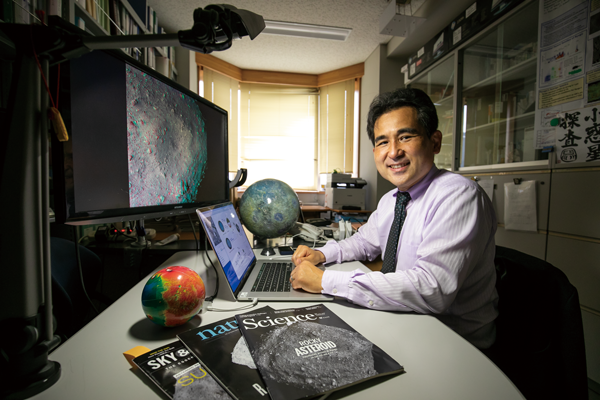
Exploring every planet

![]()
![]() Seiji SugitaProfessor, Department of Earth and Planetary Science
Seiji SugitaProfessor, Department of Earth and Planetary Science
Seiji Sugita graduated in 1992 from the Graduate School of Science at the University of Tokyo with a master’s degree. He then received his Ph.D. in geoscience from Brown University in the United States of America. He returned to the Graduate School of Science as an assistant professor while retaining a visiting researcher position at NASA’s Ames Research Center. After being an associate professor at the Graduate School of Frontier Sciences at the University of Tokyo, he was promoted to professor in 2009. He has been holding his current position since 2014.
Q. What was your favorite subject as a child?
A. Arts and crafts
Whereas most of the other subjects required students to take tests based on reading and memorizing textbooks, I felt that I could do arts and crafts in a completely free environment.
Q. What do you like about the School of Science at UTokyo?
A. The equal relationship among people who call each other "san".*
It shows the spirit of advancing discussion based on what is being said, not on titles.
*In Japan, it is customary to attach one’s (job) title whenever they are being addressed, making the hierarchical position of the people interacting explicit in every situation. “San” is a relatively neutral honorific.
Q. What is your motto?
A. In the words of Dr. Bishun N. Khare, a mentor of mine when I was doing planetary atmospheric experiments at NASA's Ames Research Center, "Do not think a difficult thing as stress. Then it becomes something to look forward to".
He was said to be the right-hand man of Carl Sagan. When I first heard it, I thought, "If people could think like that, suffering wouldn’t exist. What is he talking about?” But when I realized that it was his way of life, I felt like I understood the meaning of his words.
Q. What are your hobbies?
A. Swimming and riding bicycles
After a long day of scholarly work using my head, there is nothing more pleasant than doing physical exercise using my body.
Q. Where do you get your inspiration?
A. Inspiration for my research comes in the moments after having my morning coffee.
But if I don't lead a healthy life, nothing will come to mind even when I drink my morning coffee.
Q. Do you think there is extraterrestrial life?
A. Definitely.
We do know that there are vast numbers of planets in the universe. Moreover, a large proportion of them are Earth-like planets that meet the conditions for a warm and humid environment. If anything, it would be strange if extraterrestrial life didn’t exist.
ー Message ー
― This article is from the "Meet Researchers in the Sciences" series in The Rigakubu News ―
Meet Researchers in the Sciences
Translated by Office of Research Strategy and Development


